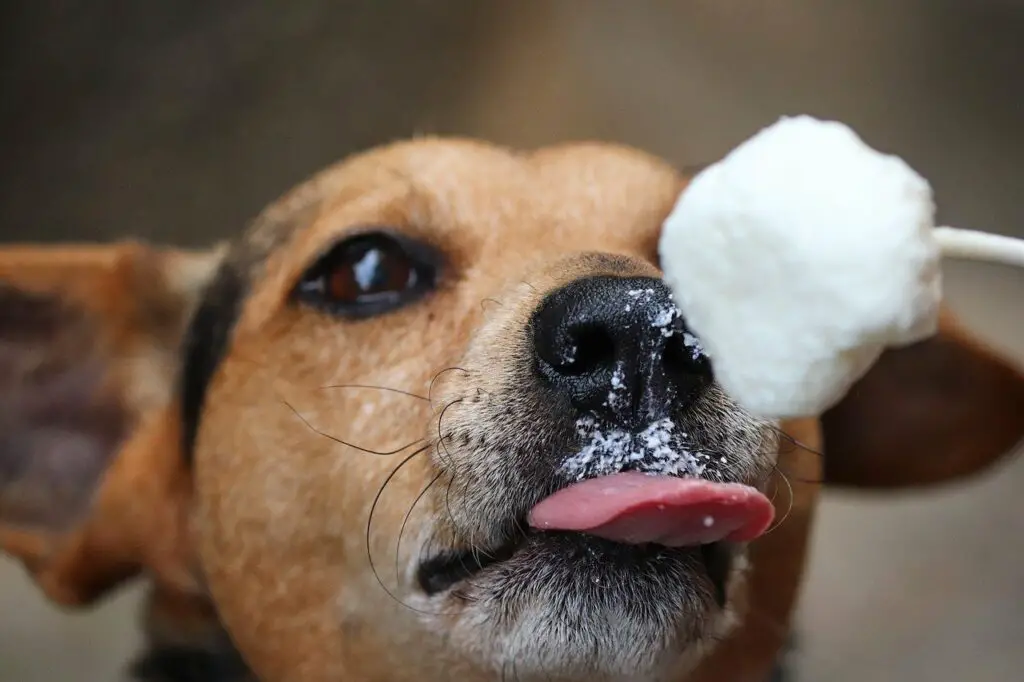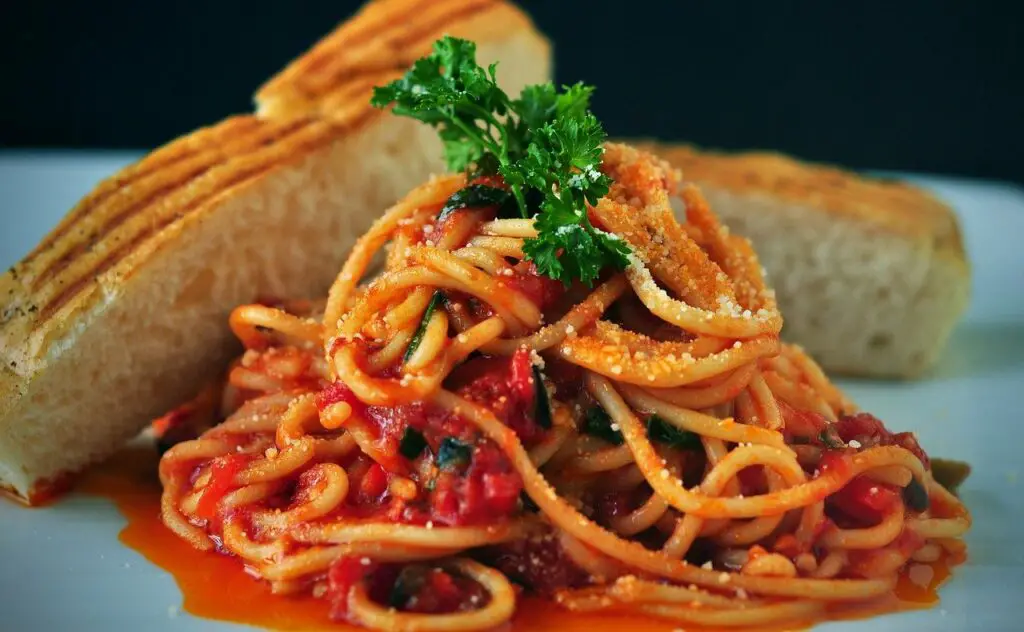Although dogs can chow down almost anything you give them, not every food is beneficial to their bodies.
When savoring some yummy pasta, you may look down and meet your dog’s eyes begging to lick some sauce.
Before you give in to the temptation, can dogs have pasta sauce?
No, dogs shouldn’t have pasta sauce.
It contains ingredients that are harmful to dogs.
Most premade pasta sauces come with spices, herbs, and vegetables that are complex for dogs to digest.
You may think that pasta sauce is just crushed tomatoes and therefore it’s harmless.
This article gives you an insight into the toxic ingredients in pasta sauce and why you should avoid feeding it to dogs.
Read on and find out how you can prepare a healthy version for your dog.

Why i pasta sauce bad for dogs?
Pasta sauce isn’t good for dog consumption because of the toxic added ingredients.
These include the following:
Garlic: Pasta sauce contains garlic which has thiosulfate, a toxic compound to dogs.
This herb damages red blood cells causing them to rupture.
The damage to red blood cells causes anemia which manifests in the form of lethargy, weakness, pale gums, and fast heart and respiratory rates.
Thiosulfate also damages the liver and leads to cancer in dogs if treatment is prolonged.
Onions: Onions contain propyl disulfide, a toxic compound that makes red blood cells break down causing anemia in dogs.
This compound attaches itself to the oxygen molecules, making red blood cells unable to carry oxygen.
The symptoms of onion toxicity include drooling, foul breath, anemia, nausea, and vomiting.
Chilli peppers: The compound, capsaicin, present in chili peppers is toxic to dogs.
It causes digestive issues such as diarrhea, vomiting, dehydration, and indigestion.
This compound also causes a burning sensation in a dog’s mouth, tongue, and throat.
Salt: Salt adds flavor to pasta sauce and dogs shouldn’t consume it.
It causes salt poisoning in dogs which you’ll notice through diarrhea, seizures, and excessive urination.
This condition can lead to death if your dog doesn’t receive immediate treatment.
Salt intake in dogs also causes hypernatremia, an increase in sodium levels in the blood, which makes a dog’s muscles shaky.

What should you do if your dog eats pasta sauce?
When your dog consumes pasta sauce, monitor its condition.
If it ate a small portion of the sauce, the effects may be minimal.
The toxicity of the sauce, however, depends on the size of the dog and the quantity of pasta sauce consumed.
If a small dog weighing below 10lbs consumes even a drop of the sauce, regardless of breed, it will exhibit instant symptoms.
Look out for symptoms such as:
- Nausea
- Restlessness
- Fast breathing
- Increased heart rate
- Dehydration
- Continuous panting
- Diarrhea
- Vomiting
In case of any symptoms, consult a veterinarian immediately.
Conditions like garlic toxicity have no cure but the veterinarian can make the dog safely vomit the toxin.
Your dog will receive treatment and medication that will stop the condition from worsening.
If, for any reason, you can’t get veterinarian help, induce vomiting within dux hours of consumption.
To do this, give the dog 3% of hydrogen peroxide.
However, if your dog is a Pugs or Pekingese breed, avoid inducing vomiting because it causes aspiration pneumonia.
How can you prepare dog-friendly pasta sauce?
The store-bought pasta sauce contains flavorings and preservatives which are harmful to dog consumption.
You should therefore prepare some at home if you want to feed your dog pasta sauce frequently.
To prepare pasta sauce for your dog, use red, ripe tomatoes, celery, and carrots in small quantities.
These ingredients contain nutrients such as antioxidants and vitamins which are healthy for dogs.
The preparation involves sauteing the ingredients in olive oil.
Tomatoes contain antioxidants such as beta carotene and carotenoids lycopene which boost digestion in dogs.
They’re also good sources of Vitamins A and C which give dogs healthy vision and skin.
Celery will provide your dog with fiber, folate, and potassium.
Carrots are a good source of Vitamin A and beta carotene.
When preparing the sauce, only use the tomato fruit.
Avoid using other parts of the tomato plant as they contain tomatine, a compound that’s poisonous to dogs.
Can you feed dogs pasta without sauce?
Since it’s clear that pasta sauce, especially the store-bought option, is harmful to dogs, you may be wondering if you can feed your dog plain pasta without the sauce.
Dogs can eat small quantities of plain pasta without sauce once or twice a week.
You shouldn’t feed your dog more than a cup of plain pasta in one serving as excessive consumption is harmful to its health.
Feeding your dog too much plain pasta leads to weight gain and obesity.
This results in health conditions such as breathing difficulties, heart disease, and high blood pressure.
FAQs
Can pasta sauce cause death to dogs?
Pasta sauce can cause death to dogs if taken in large quantities because its main ingredients, onions, and garlic, are toxic.
If a dog doesn’t receive immediate treatment from a veterinarian after consuming the sauce, the symptoms may worsen and cause death.
Can you feed pasta sauce to puppies?
You shouldn’t feed pasta sauce to puppies.
Their digestive systems aren’t fully developed to handle the ingredients in the sauce.
In addition, it’s too soon to tell if the puppy has allergic reactions to any of the ingredients.
As a result, they may experience diarrhea and rashes after consuming the sauce.
Are there dogs that are more susceptible to toxicity from pasta sauce?
Some dog breeds such as Shiba Inus and Akitas are susceptible to garlic toxicity, one of the main ingredients in pasta sauce.
Dogs under any form of medication are also more prone to toxicity from the pasta sauce ingredients than those that are healthy.
Conclusion
Although it’s tempting to share every meal with your furry friend, pasta sauce shouldn’t be one of them.
It contains ingredients that can cause toxicity and death to dogs.
When your dog consumes pasta sauce, seek immediate help from a veterinarian to avoid worsening the condition.
If you must give your dog the sauce, consider preparing it yourself using healthy, nontoxic ingredients.
- What Dog Breeds Have Pink Skin? - March 24, 2023
- What Are the Most Inspiring Dog Breeding Quotes? - March 20, 2023
- Can Pheromone Spray Help Improve Dog Breeding Results? - March 19, 2023








